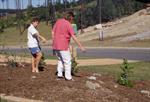
Work as A Horticultural Consultant
What They Do
Horticultural consultants are people who sell advice. There are many different types of horticultural consultants.
- Some provide broad based advice – they will go to any garden, farm or horticultural enterprise and advise on how to better grow the plants or how to solve a problem that is facing the property.
- Some provide advice within just one sector of the horticulture industry – they may focus on plant nurseries, trees, turf, soils, home gardens, hydroponic farms or something else.
What Is Needed
Consultants need broad based horticultural knowledge, usually to a diploma or degree level (3 years of full time study), combined with several years of hands on experience. Most consultants would work in industry for 10 years or  more after their initial studies. They build their expertise, and develop a strong network of contacts which can be invaluable later on, both for getting work, and for solving problem.
more after their initial studies. They build their expertise, and develop a strong network of contacts which can be invaluable later on, both for getting work, and for solving problem.
They may work as sole operators or in small teams of other experts - they need:
- To be good communicators
- To be effective time managers

- To be able to market themself effectively
- Technical expertise
Where They Work
Horticultural experts are increasingly in demand by individual property owners, through to both private businesses and public authorities.
Private individuals may appoint a consultant to visit their property to offer advice about a particular problem or problems affecting a plant or group of plants in their garden. They may also advise on garden design and renovation, routine maintenance, tree and turf issues etc.
Government agencies and departments may also use consultants. They engage an expert for jobs that do not warrant a permanent employee: major development projects (e.g. building a new sporting facility), or dealing with a significant pest and disease problem.
Small companies may use a horticultural consultants (rather than permanent employees) as a cost effective way of gaining expert advice for example, a small company may employ a consultant to manage the installation of a green wall in their office, or landscape a car park.
Large Corporations sometimes engage consultants to provide their expertise to a wide range of individuals or groups employed by that organisation. Property developers, mining companies, hotel resorts etc. heavily involved in land management, will always need horticultural expertise. Some horticultural consultants establish a clientele with such companies at a level that guarantees strong and reliable income.
Opportunities
Consultants can earn a relatively high
hourly rate - but in order to achieve a high income and constant cash
flow they need to obtain sufficient, consistent work from clients. Some
consultants achieve this by building a group of regular clients who
arrange routine visits, while others simply build an exceptional
reputation where they have a long waiting list.
Sometimes being a consultant can lead to other work opportunities associated with consulting:
Interim Managers: Sometimes businesses and agencies may need to appoint a manager on a temporary basis. Often this is in a higher management role such as an executive and may be regarded as somewhere between a manager and a consultant.
Project Managers: When a consultant becomes involved in the early stages of a project (eg. by doing a feasibility study), they may sometimes be an attractive candidate to manage the project in future due to the familiarity with the project specifics as well as the broader skills needed to complete the project.
Expert Witnesses: Anyone with expert knowledge in horticulture may act as an expert witness in court. Over recent years there has been a trend towards establishing registries of expert witnesses who are willing to make themselves available to provide information in court cases.
Trainers, Researchers, Writers: Working as a consultant involves delivering advice or information that is deficient in an organisation. Providing teaching services to deliver that information or advice, undertaking further research into a horticultural subject, or writing about it is often a natural progression for the consultant.
MORE ADVICE
Use our FREE COURSE & CAREERS ADVISORY SERVICE (click)
More from ACS
Ebook - Whether you work for yourself or someone else, you need to be able
to present what you have to offer in a way which attracts employers.
As a consultant, you need to stand out from others in your field.
View eBook
Ebook - A classic that has helped many to start up and run a successful business.
View eBook
Ebook - helps you sort through the clutter and explains the many types of jobs that people who enjoy working with others may enjoy.
View eBook
Become a Professional horticulturist studying 2 years full time; 4 years p/t
View Course